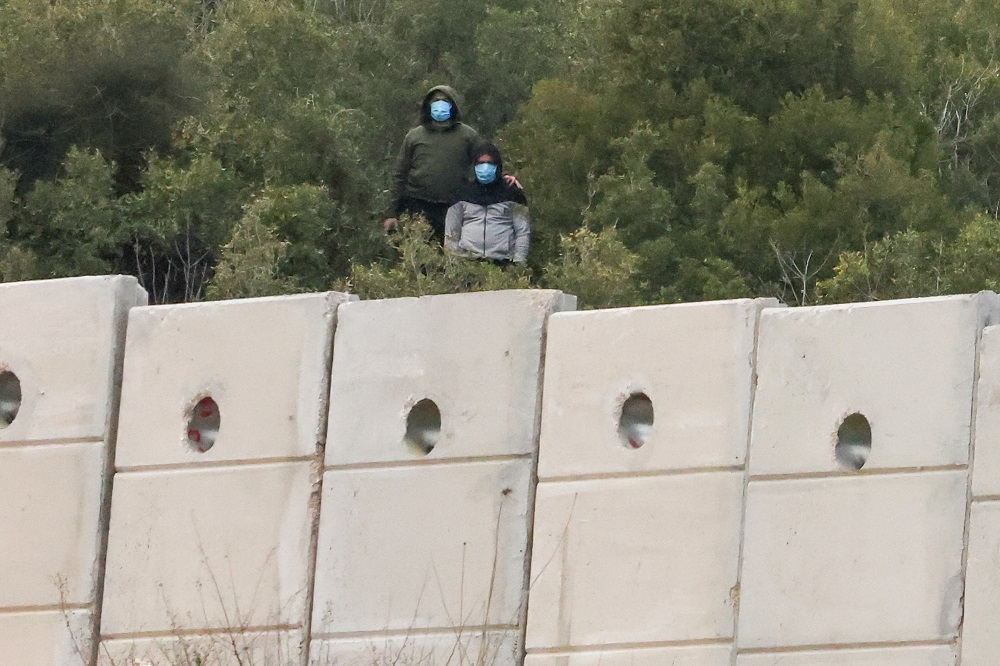Acting with Wisdom, Not Just Force
Hezbollah has established armed outposts beyond the “Blue Line” that separates Lebanon from Israel. So far, Israel has chosen diplomatic recourse, which is wiser.

Photo by Yossi Zamir, Flash90
Last week it was reported that Hezbollah has put up two tents, with between three and eight armed operatives staying on site, in the Mount Dov area, beyond the “Blue Line” that separates Lebanon from Israel. This boundary was delineated by the United Nations when Israel withdrew from Lebanon in 2000.
There is no doubt that Israel should not meekly accept this blatant infringement of UN Security Council Resolution 1701, which brought the Second Lebanon War to an end. That resolution demands that both Israel and Lebanon “fully respect” the Blue Line. Some have expressed surprise that Israel has not rushed to respond to the current infringement with force, and instead has announced that it is working to resolve this incident through diplomatic channels. But when we consider the broader context, we can see that Israel is acting wisely.
Undoubtedly, Hezbollah’s actions are a provocation, and it is equally clear that the IDF could put an end to this incursion within seconds of the order being given. At the same time, we know that the Hezbollah post has been under constant surveillance from the moment it was identified, and there is no danger of it serving as a base for a surprise attack on our forces.
In order to pursue a wise course of action, Israel must first stop to ask what it is that Hezbollah seeks to achieve by this provocation and how it can be prevented from attaining that desired outcome—and even be made to pay a price for its actions. The forward post is located in an area referred to by the Lebanese as the Shebaa Farms, which was right on the border between Syria and Lebanon before 1967 and was likely part of Syria, though Lebanon also claims sovereignty over it. Along with the Golan Heights, the area came under Israeli control following the Six Day War. Regardless of this background, UN Security Council Resolution 1701 unequivocally obligates Israel and Lebanon to respect the Blue Line drawn by the United Nations and not to cross it. The resolution leaves the dispute over the Shebaa Farms to be addressed in a future agreement. Hezbollah, then, can argue that it is in “occupied Lebanese territory,” but even if this claim were true, its presence beyond the Blue Line violates the Security Council resolution.
Israel’s decision to refrain from immediate use of force and to involve UNIFIL in the incident led to the United Nations conducting an assessment of the situation on the ground, which concluded that Hezbollah had crossed the Blue Line and violated the Security Council resolution. This ruling by an objective entity is highly significant. In addition, Israel’s ambassador to the United Nations filed a complaint to the Security Council over the violation, supported by photographic evidence. Israel has highlighted Hezbollah’s provocative and irresponsible conduct, and also drawn attention to the Lebanese government’s impotence to assert its sovereignty over southern Lebanon. The overt armed presence of Hezbollah in this region, under the organization’s flag, in itself constitutes a violation of the Security Council resolution even without crossing the Blue Line, as the resolution prohibits armed presence south of the Litani River by any party except the Lebanese Army and UNIFIL. If external or internal pressure in Lebanon, or a resolute action by UNIFIL will not bring the evacuation of the Hezbollah from their current position, Israel will have full legitimacy to use force, as the current situation meets the requirement in international law of exhausting diplomatic options before resorting to the use of force.
The current affair demonstrates the complexity of Israel’s security challenges on its northern front, given the variety of players involved (as well as Hezbollah, these include Lebanon, UNIFIL, and Syria) and the historical disputes over the exact delineation of the border. In such situations, force must be deployed wisely and in accordance with the international laws governing the use of force. In my recent policy study (Danger from the North: Challenges Regarding the Use of Force in International Law, Israel Democracy Institute), I presented the main rules that apply, as well as the lessons that can be learned from the Second Lebanon War, and used these to analyze five imaginary but realistic scenarios that might ignite war in the north. This analysis served as the basis for recommendations regarding the steps that Israel can take to prepare itself for conflict, and even to reduce the likelihood of conflict. Without prejudicing the right of the State of Israel to use military force to defend itself, the wisest course of action also involves other tools—legal, economic, and diplomatic.
Colonel (Res.) Dr. Liron Libman is the former head of the IDF International Law Department and a former research fellow at the Israel Democracy Institute.
Currently, he has a private practice as a lawyer and a mediator and teaches International Law at Sapir Academic College.
